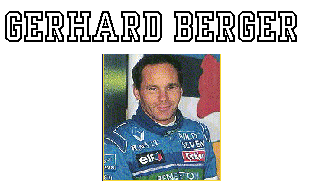|
There is an outward enthusiasm about Gerhard Berger when he is away from the intense business of the pit lane, and this sometimes disguises the sheer steel and determination which suffuses his character. Blooded in the high-pressure political environment of the Ferrari team for three years, he faced the unenviable task of succeeding Alain Prost alongside Ayrton Senna at the wheel of the second McLaren-Honda at the start of 1990.
It took the Austrian the best part of two seasons to come to terms with the challenge, but in the latter stages of 1991, he finally seemed to have got on top of hew new position and, in qualifying at least, proved more than capable of holding his own with Senna. It was as if Gerhard had finally got the last pieces of a complex jigsaw in place, a puzzle which it had seemed certain he would complete much earlier in his career, judging by his startling initial progress in the sport's premier league.
With F3 and touring car experience under his belt, this son of an Austrian road haulage contractor breezed into F1 at the wheel of an ATS-BMW towards the end of 1984. He failed to finish on his home ground at Oesterreichring, but stormed home to finish strongly at Monza a few weeks later in the Italian GP. Sadly, he had not originally been entered as a regular championship contestant and so was not awarded the point normally accruing to sixth place.
Barely twenty-five years old, Berger's racing horizons seemed to be widening dramatically, but his career very nearly ended in the winter of 1984/1985 with a serious accident near his home in the Tirol. He fractured a vertebra in his neck and spent most of the off-season recuperating. He recovered in time to join Thierry Boutsen in the Arrow-BMW line-up for 1985, highlighting his season with a fifth place in South Africa and sixth in Australia.
For 1986, he switched to the Benetton-BMW team and really began to mature, displaying considerable flair and expertise. After leading his home Grand Prix commandingly at the Oesterreichring, only to be troubled by battery problems, his great day finally came when he won in Mexico City. In searing heat, he judged the situation superbly, profiting from a non-stop run on his Pirelli rubber when his Goodyear-shod rivals were obliged to stop for fresh tires on two and even three occasions.
By this time, Berger's signature was already dry on a Ferrari contract for the following season and, after a shaky start to 1987, he picked up the pace and soon proved his quality as a front runner. He won the Japanese GP to return to "Prancing Horse" to the winners' circle for the first time in over two years. A short time latter he followed that up with a flag-to-flag victory in Adelaide, raising hopes for a serious championship challenge the following year.
However, this turned out to be a disappointing hope. The McLaren-Hondas steamrollered the opposition, but Berger picked up a somewhat lucky win at Monza when both Senna and Prost faltered. He had a rotten year in 1989 (no partnered by Nigel Mansell) and was lucky to escape with superficial injuries from a spectacular, fiery accident during the San Marino GP at Imola.
At the end of 1989, he was offered a job at McLaren alongside Senna. However,much of the 1990 season was spent settling into the team which took a disappointingly long time making his body fully comfortable in the MP4/5B cockpit. It was an unhappy period and his morale began to suffer, but he got back in control of his career towards the end of 1991 and the old Berger grin began to reappear once more. Being paired with a genius like Senna was never going to be easy, but Berger made the best of it.
Although he had several Grand Prix wins during this period, his best is thought to be at Adelaide at the end of 1992 where his tactics were the deciding factor.
He joined Ferrari in 1993 and didn't adjust easily to "active" suspension. His best result was a third place in Hungary. This disappointing year could not compare with what was to follow in 1994 though. With the loss of his friends Senna and Ratzenberger, Gerhard seriously considered his future in racing. His decision to continue was welcomed and he went on to win the German Grand Prix - the first win for Ferrari in nearly four years. In fact, Berger's relationship with Ferrari was a strong one and he worked hard during 1995 - effort that was not really reflected in his six third-place finishes. Michael Schumacher's arrival at Ferrari for 1996 may or may not have influenced his decision to join Benetton at the start of that season but the chance to drive with his former partner, Jean Alesi, again probably did.
|
|
